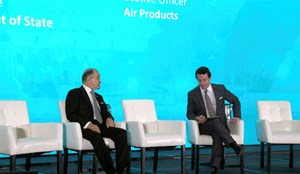News
Supply vs. demand: Air Products plans for the future of the global H2 economy
On day 1 of the Hydrogen Americas Summit, co-hosted by the Sustainable Energy Council and the U.S. Department of Energy (DOE), David Livingston, Senior Advisor, Office of the Special Presidential Envoy for Climate at the U.S. DOE and Seifi Ghasemi, Chairman, President and Chief Executive Officer for Air Products sat down for a discussion about Air Products’ vision for a global H2 economy.
Ghasemi begins by explaining why clean H2 is such an important molecule. “If you look at the future and we want to have a clean environment, we need to generate our energy either by wind, solar, hydro, nuclear or other kinds of renewables,” Ghasemi said. “All these sources of energy generate electricity, and we can use the electricity to electrify our passenger cars, heat our buildings, cooking and lighting.”
He went on to touch on the hard-to-abate industries, such as the heavy-transport, trains, planes, steel and chemical sectors. He said that these sectors are unable to be decarbonized by electricity, and H2 is required. “How can you expect an operator of a fleet of 2,000 trucks to make the investment to convert their trucks or trains into H2 fuel cell vehicles if they don’t know that there will be a supply of green H2,” Ghasemi said. “If they know that it is there and they can buy it, then I think they will have the incentive.”
The next topic was H2 projects and the Inflation Reduction Act (IRA). Ghasemi claimed that Air Products’ believes the future is H2 and that they will move forward with or without government assistance. “The key thing for the project to happen is the investment decision, and we were fortunate that Air Products had the financial ability to commit to some of these projects, like the project in Saudi Arabia, without any kind of government support or financial support from banks,” Ghasemi said. “Once we committed and announced that project, now everybody is coming to us, and they want to help us finance.”
Ghasemi continued by describing the impact of the IRA. He said that Air Products announced a $4.5-B project to develop nearly 2,000 tpd of blue H2 in Louisiana, U.S. The IRA was announced after the final investment decision, giving Air Products $85/t to sequester CO2. According to Ghasemi, they will be producing 5 MMtpy of CO2 and can capture 95%, resulting in a profit of over $400 MM.
“We had projects in the U.S. to make green H2, either from wind and solar or hydropower,” Ghasemi said. “Now, with the IRA, they have the incentive of $3/kg. “We immediately announced a $500-MM project in New York using Niagara Falls power. The IRA is going to help us make investments of $15 B within the next four years in the U.S.”
Ghasemi wrapped up the conversation by explaining the number one thing he would ask governments and private sector players to generate the demand for H2. Ghasemi claimed he would ask for a global carbon tax. “A global carbon tax will take care of the demand immediately,” Ghasemi said. “In California, if you convert your truck, then there is an incentive. Some people will decide to use it, and some people will decide not to use it, but if there is a carbon tax, then everybody would have to use it.”
Story by: Tyler Campbell, Managing Editor, H2Tech


